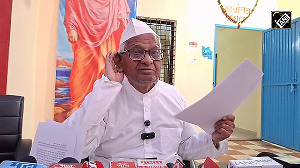Frank J Cilluffo, director of the Homeland Security Policy Institute of George Washington University, has told the United States Congress that the endemic corruption found in every level on India's law enforcement apparatus is a major impediment to India-US counterterrorism cooperation.
Cilluffo, testifying before the House Foreign Affairs Subcommittee on Terrorism, which convened a hearing on US-India Counterterrorism Cooperation: Deepening the Partnership, told lawmakers, "While we have made great strides in expanding our relationship with India in the counterterrorism space, obstacles to increased cooperation remain."
Cilluffo said despite the plethora of anti-terrorism initiatives between Washington and Delhi, as well as a host of other mechanisms for cooperation, "a trust deficit encompasses the US-India relationship."
"The US relationship with Pakistan as well as Indian perceptions of the US withholding intelligence on Islamic militants in Jammu and Kashmir continues to be a source of distrust, one that prevents deeper cooperation between our two nations," he said.
But more specifically, Cilluffo noted, "One aspect of the Indian security structure that deters cooperation is endemic corruption found in every level of India's law enforcement apparatus."
"Corruption prevents front-line police officers from fulfilling their duty effectively as they often concede to bribes and regional policies, rather than focusing on community policing and accurate crime reporting," he said.
Cilluffo said, "Another obstacle to greater intelligence sharing between the US and India is a notion that pervades the US intelligence community regarding the Soviet KGB's close relationship with the Indian intelligence structure, the Research and Analysis Wing."
He claimed, "Vestiges of the Cold War represent a reality that rightfully leave many in the US counterterrorism community hesitant to engage in deeper involvement until further assurances are made that the information can be appropriately protected."
"While high-level security talks are important, the breakdown of barriers will only occur if regular exchanges between mid-level security services officials are encouraged," he said.
Cilluffo acknowledged that enhanced cooperation with India would necessarily complicate US cooperation with Pakistan, but argued, "The truth is that American-Pakistani cooperation is erratic, and varies based on the political climate and bureaucratic interests in Islamabad, with attitudes and actions varying between and across agencies."
Cilluffo was quick to add that despite some of these recent promising developments, "the US cannot allow its national security to be held hostage by nearly two decades of unfulfilled expectations in Pakistan."
"It is vital that the United States now work to deepen America's cooperative relationships with India's internal security architecture to counter the terror threat that permeates and extends beyond the region," he said.
Congressman Ed Royce, California Republican and chairman of the Congressional Subcommittee, said, "I'd like to get to a point where our counterterrorism exchanges are just as high-profile, numerous and unprecedented as our combined military exercises".
Royce said, "Let's be clear: this is more than just helping a democratic ally. There are real, hard US interests at stake. Simply put, the militants targeting India are also targeting us."
He recalled how at a recent subcommittee hearing on the Future of Al Qaeda after bin Laden's death, many experts placed just as much importance on Pakistan-based Lashkar-e-Tayiba as any Al Qaeda affiliate. "LeT, India's mortal enemy, has gone global, with Western targets in its sights," he said.
The lawmaker, while acknowledging that "in the past decade, US relations with India have grown considerably," bemoaned that "we've hit a lull."
"Counterterrorism cooperation is a way to reinvigorate this relationship, and better protect America," Royce predicted.








